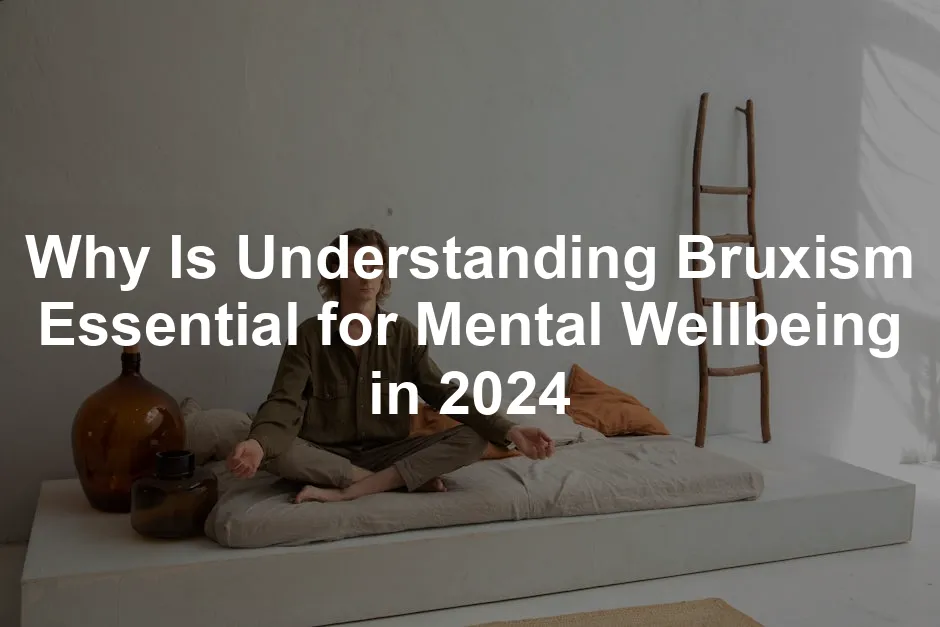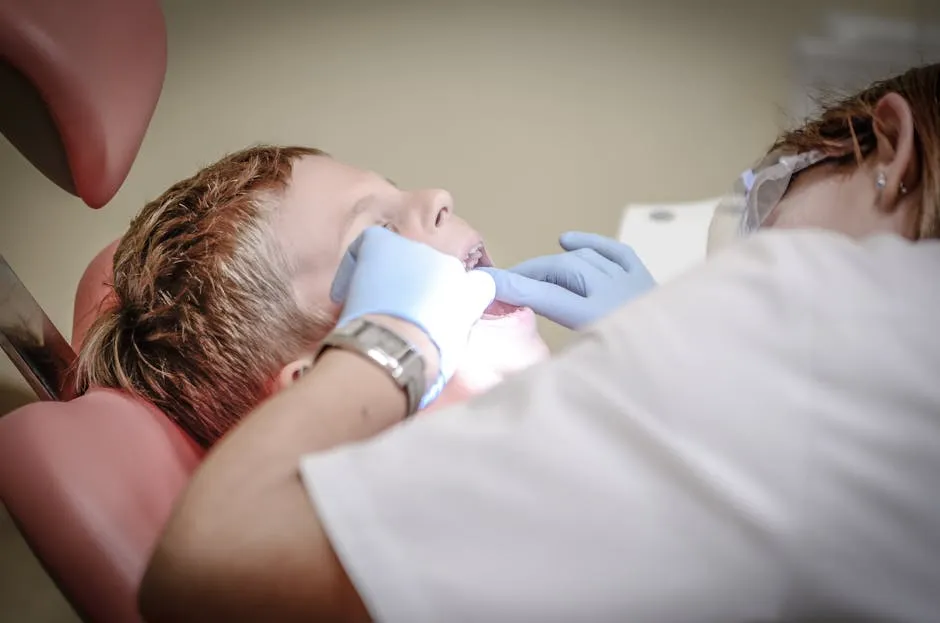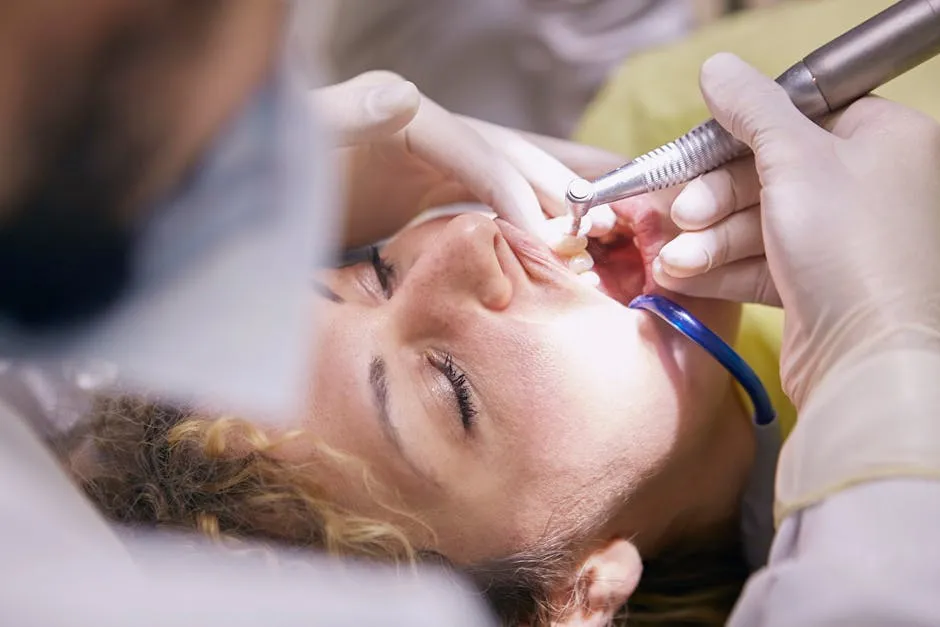
Why Is Understanding Bruxism Essential for Mental Wellbeing in 2024
Introduction
Bruxism, the sneaky habit of grinding teeth, often plays hide-and-seek in our busy lives. You might not even realize you’re doing it—especially when the grind kicks in during your beauty sleep. But here’s the kicker: this seemingly harmless habit can cause chaos not just for your dental health but for your mental well-being too. As we step into 2024, the importance of understanding bruxism is at an all-time high.
With stress levels skyrocketing—thanks, modern life!—bruxism is becoming more prevalent. Studies show that 8-31% of people experience this condition, particularly in stressful situations. The grinding can lead to a slew of symptoms: jaw pain, headaches, and even sleep disturbances. Imagine waking up feeling like you’ve been in a boxing ring instead of a cozy bed!
So, why should we care? The intricate dance between bruxism and our mental health can be a real game changer. Awareness of this connection is crucial. It allows us to take proactive steps toward better mental and dental health. Grab your favorite herbal tea for relaxation, find a comfy spot, and let’s uncover the threads tying together bruxism, mental wellness, and the need for holistic care. Your smile—and sanity—will thank you!

Understanding Bruxism
What is Bruxism?
Bruxism is the involuntary grinding or clenching of teeth. It can happen during sleep or while awake. Sleep bruxism occurs at night and is often linked to sleep disorders. Awake bruxism happens during the day, typically in response to stress or anxiety.
Studies show that bruxism affects 8-31% of people globally. This condition is common among adults, but children can experience it too. A recent survey indicated that between 15% to 40% of kids grind their teeth at night. So, if you notice your child sounding like a tiny chainsaw while sleeping, it might be time for a dental check-up!

Causes and Risk Factors
Bruxism doesn’t just pop up out of nowhere; it has its roots in various factors, both psychological and physical.
Psychological Factors: Stress and anxiety are major culprits. When life gets overwhelming, our jaws often bear the brunt of our tension. Studies reveal that individuals under chronic stress are more likely to grind their teeth, creating a vicious cycle. The more stressed you feel, the more you grind, and the more you grind, the more stressed you become. To learn more about coping strategies for anxiety, check out this article on why are coping strategies essential for handling anxiety in daily life.
Understanding the connection between stress and bruxism can be vital for managing both conditions effectively. Learn more about coping strategies for anxiety.
Physical Factors: Sleep disorders like sleep apnea can also contribute to bruxism. If you’re tossing and turning at night due to interrupted breathing, your jaw may take on an unwanted role as a night-time noisemaker. Additionally, dental misalignment can lead to discomfort that triggers grinding.
Lifestyle factors also play a part. Consuming caffeine or alcohol can increase the likelihood of teeth grinding, especially if you’re reaching for that extra cup of coffee or glass of wine to cope with stress. On that note, consider switching to a herbal tea instead!
Recognizing these risk factors is essential. Knowing what triggers bruxism can help you devise a plan to manage it effectively.

The Impact of Bruxism on Mental Wellbeing
Psychological Implications
Bruxism can wreak havoc on your mental health. The connection between teeth grinding and anxiety is well-documented. When you grind your teeth, you might not realize that you’re manifesting inner turmoil. As a result, this condition can contribute to mood disorders like anxiety and depression.
Stress triggers teeth grinding, and that grinding disrupts sleep, leading to more stress. It’s a slippery slope! The fatigue from poor sleep can heighten irritability and lead to cognitive issues. You may find yourself feeling more overwhelmed by everyday tasks, creating a perfect storm for mental distress.

Physical Consequences
The physical ramifications of bruxism extend beyond teeth wear. Grinding can severely affect sleep quality. Waking up with a sore jaw or a headache can be common for those with bruxism. The constant clenching and grinding can lead to muscle tension and discomfort, making it difficult to relax. To aid in relaxation, consider trying a weighted blanket that can give you a sense of security and calm.
Poor sleep quality is closely linked to mental health issues. Research shows that those who experience disrupted sleep are at a higher risk for anxiety and depression. Think of it this way: when you don’t sleep well, your brain doesn’t get the chance to recharge, leading to a foggy, less responsive mental state.
In summary, the impact of bruxism on mental well-being is significant. Addressing this condition is not just about protecting your teeth; it’s about safeguarding your mental health. Remember, awareness is the first step towards managing bruxism effectively. Your teeth—and your peace of mind—will thank you!

Signs and Symptoms of Bruxism
How to Recognize Bruxism
Bruxism isn’t just a fancy term for grinding teeth; it’s a sneaky little monster that can creep up on anyone. So, what should you be on the lookout for? First off, jaw pain is a major red flag. If you wake up feeling like you’ve bitten into a hard rock, bruxism might be to blame.
Headaches are another common symptom, especially if they strike first thing in the morning. The tension in your jaw can radiate, leaving you feeling like a character in a cartoon with a giant headache cloud overhead. A headache relief roll-on can be a handy tool to soothe that pain away!
Then there are your teeth—those precious pearly whites. If they appear worn down or chipped, it’s time to take a closer look. Noticing sensitivity when sipping hot coffee or icy cold water? That’s your enamel waving a white flag.
Self-awareness is key! Keep tabs on these symptoms. A little monitoring can go a long way in catching bruxism early. The sooner you identify the problem, the sooner you can start addressing it. After all, nobody wants to wake up feeling like they’ve been wrestling all night!

When to Seek Help
Now, let’s talk about when it’s time to call in the cavalry—your healthcare professional. If your symptoms start to snowball, it’s time to take action. Jaw pain that’s becoming unbearable? Check. Persistent headaches that just won’t quit? Double check.
Severe symptoms can lead to more significant dental issues, so don’t brush them aside. Consulting a healthcare professional is crucial for proper diagnosis and treatment. They can help you get to the root of the problem and devise a plan to tackle it head-on. Remember, it’s better to be safe than sorry when it comes to your health, especially your mental well-being.

Managing Bruxism and Enhancing Mental Wellbeing
Stress Management Techniques
In today’s fast-paced world, stress management is more vital than ever, especially for bruxism sufferers. So, how can you keep your stress levels in check? Let’s start with relaxation techniques. Meditation can be a game changer. Just a few minutes of mindfulness each day can shift your mindset and ease tension. You might want to try a guided meditation CD to help you get started!
Yoga is another fantastic option. It stretches not just your body, but your emotional resilience. Pair that with some good old-fashioned exercise, and you’ve got a winning combination. Whether it’s a brisk walk or a high-energy workout, physical activity releases endorphins—your body’s natural stress relievers. And to keep you on track, consider using a fitness tracker!
Cognitive-behavioral strategies can also work wonders. Identifying negative thought patterns and learning to reframe them can help alleviate anxiety. Talking to a therapist can provide you with tailored tools to manage stress effectively.
In the quest for mental well-being, remember: it’s about finding what works for you. By prioritizing stress management techniques, you’re not just protecting your teeth; you’re nurturing your mental health. And that’s a win-win!

Professional Interventions
Managing bruxism requires a multi-faceted approach that includes both dental and psychological support. Let’s dive into some of the most effective professional interventions.

Dental Treatments: Mouthguards, Botox, Therapy
Dental professionals often recommend custom mouthguards to protect your teeth from grinding. These nifty devices act as shock absorbers, preventing wear and tear on your precious enamel. Imagine wearing a cozy pillow for your teeth while you sleep—sounds dreamy, right?
For those with more severe cases, Botox has emerged as an innovative solution. Injecting Botox into the jaw muscles can help reduce their activity, alleviating the pressure and tension caused by bruxism. It’s a bit like hitting the reset button on your jaw!
Additionally, dental therapy may involve corrective procedures if misalignment is contributing to grinding. Your dentist can evaluate your bite and suggest adjustments or treatments to keep your smile in check.

Psychological Support: Counseling, Therapy, and Lifestyle Adjustments
It’s essential to address the mental health aspect of bruxism too. Stress and anxiety are significant contributors to this condition. Engaging in counseling or therapy can provide valuable coping strategies. A therapist can help you unpack the emotional baggage that may be leading to those late-night grinding sessions. To support your mental health journey, consider using a self-help book on anxiety.
Lifestyle adjustments can also play a crucial role in managing both stress and bruxism. Incorporating relaxation techniques such as meditation, yoga, or deep-breathing exercises can soothe your mind and help keep your jaw relaxed. After all, a calm mind leads to a calm jaw—who knew that inner peace could also mean fewer headaches?
In summary, a combination of dental interventions and psychological support creates a well-rounded approach to managing bruxism effectively. By prioritizing both your dental health and mental well-being, you can pave the way for a healthier, happier you.

FAQs
What are the most common causes of bruxism?
Bruxism often stems from stress and anxiety. When life gets hectic, our jaws can take the hit. But it doesn’t stop there! Lifestyle choices also play a role. Caffeine and alcohol, for instance, can ramp up teeth grinding. So, next time you reach for that third cup of coffee, remember your teeth might not be thanking you!
How can I tell if I have bruxism?
Wondering if you’re grinding your teeth? Look out for some telltale signs! Jaw pain is a big one. If you wake up feeling like you’ve been chewing on a rock, that’s a clue. Morning headaches can also indicate bruxism, especially if they strike before your first sip of coffee. And don’t forget about worn teeth! If your pearly whites are looking a little worse for wear, it may be time for a dental check-up.
What treatments are available for bruxism?
Treatments for bruxism come in various forms. Stress management techniques can work wonders. Think meditation, yoga, or even a good old-fashioned bubble bath! Dental appliances, like custom mouthguards, can protect your teeth while you sleep. And if the grinding stems from deeper mental health issues, therapy could be beneficial. Remember, it’s about finding the right combination that works for you!
Can bruxism be prevented?
While bruxism may not be fully preventable, there are steps you can take to reduce its occurrence. Managing stress is key! Incorporating relaxation techniques and maintaining good sleep hygiene can significantly help. Create a calming bedtime routine, and try to keep caffeine and alcohol in check. Your teeth—and your mind—will thank you!
When should I see a dentist for bruxism?
If you’re experiencing persistent symptoms, it’s time to consult a dentist. Jaw pain that won’t budge? A constant headache? Or maybe your dental health is at risk? Don’t ignore these signs! Seeking professional help can lead to effective treatment and peace of mind. Remember, early intervention is crucial for maintaining both your dental and mental health.
Please let us know what you think about our content by leaving a comment down below!
Thank you for reading till here 🙂
All images from Pexels




